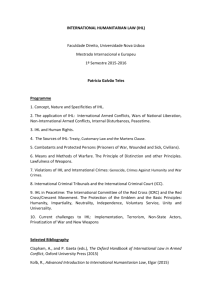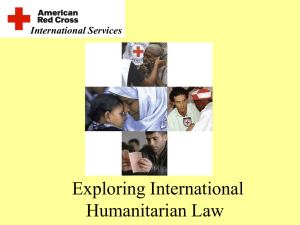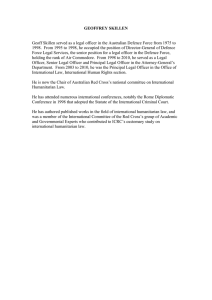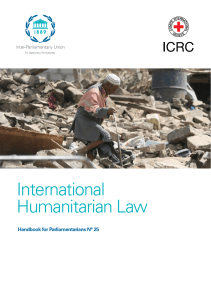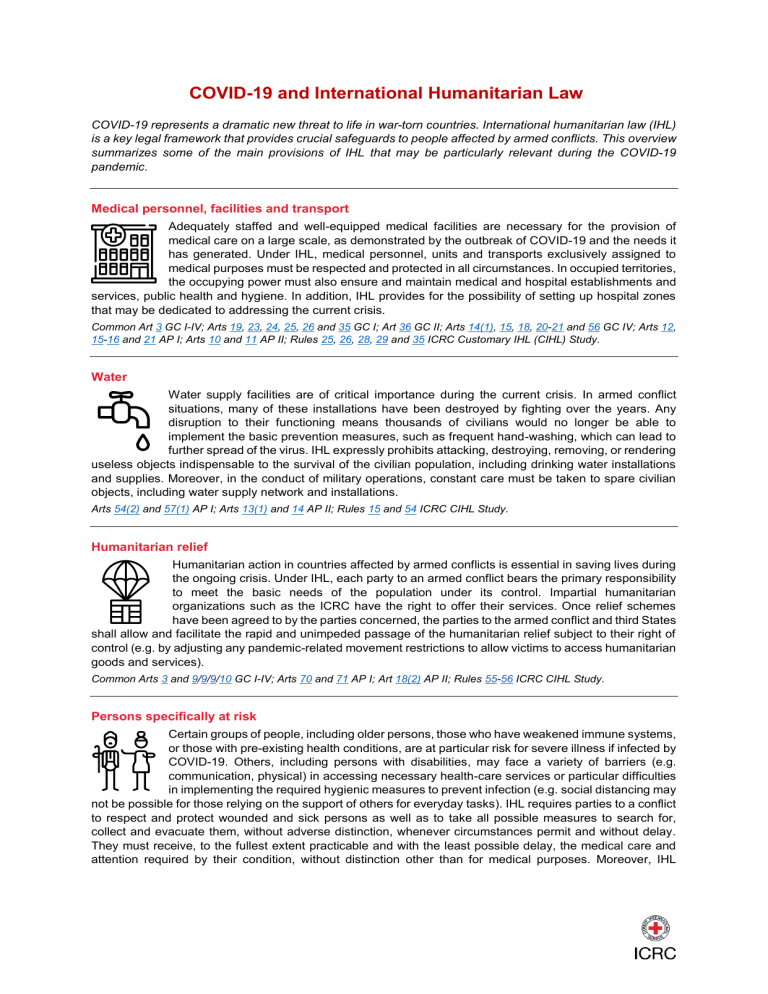
COVID-19 and International Humanitarian Law COVID-19 represents a dramatic new threat to life in war-torn countries. International humanitarian law (IHL) is a key legal framework that provides crucial safeguards to people affected by armed conflicts. This overview summarizes some of the main provisions of IHL that may be particularly relevant during the COVID-19 pandemic. Medical personnel, facilities and transport Adequately staffed and well-equipped medical facilities are necessary for the provision of medical care on a large scale, as demonstrated by the outbreak of COVID-19 and the needs it has generated. Under IHL, medical personnel, units and transports exclusively assigned to medical purposes must be respected and protected in all circumstances. In occupied territories, the occupying power must also ensure and maintain medical and hospital establishments and services, public health and hygiene. In addition, IHL provides for the possibility of setting up hospital zones that may be dedicated to addressing the current crisis. Common Art 3 GC I-IV; Arts 19, 23, 24, 25, 26 and 35 GC I; Art 36 GC II; Arts 14(1), 15, 18, 20-21 and 56 GC IV; Arts 12, 15-16 and 21 AP I; Arts 10 and 11 AP II; Rules 25, 26, 28, 29 and 35 ICRC Customary IHL (CIHL) Study. Water Water supply facilities are of critical importance during the current crisis. In armed conflict situations, many of these installations have been destroyed by fighting over the years. Any disruption to their functioning means thousands of civilians would no longer be able to implement the basic prevention measures, such as frequent hand-washing, which can lead to further spread of the virus. IHL expressly prohibits attacking, destroying, removing, or rendering useless objects indispensable to the survival of the civilian population, including drinking water installations and supplies. Moreover, in the conduct of military operations, constant care must be taken to spare civilian objects, including water supply network and installations. Arts 54(2) and 57(1) AP I; Arts 13(1) and 14 AP II; Rules 15 and 54 ICRC CIHL Study. Humanitarian relief Humanitarian action in countries affected by armed conflicts is essential in saving lives during the ongoing crisis. Under IHL, each party to an armed conflict bears the primary responsibility to meet the basic needs of the population under its control. Impartial humanitarian organizations such as the ICRC have the right to offer their services. Once relief schemes have been agreed to by the parties concerned, the parties to the armed conflict and third States shall allow and facilitate the rapid and unimpeded passage of the humanitarian relief subject to their right of control (e.g. by adjusting any pandemic-related movement restrictions to allow victims to access humanitarian goods and services). Common Arts 3 and 9/9/9/10 GC I-IV; Arts 70 and 71 AP I; Art 18(2) AP II; Rules 55-56 ICRC CIHL Study. Persons specifically at risk Certain groups of people, including older persons, those who have weakened immune systems, or those with pre-existing health conditions, are at particular risk for severe illness if infected by COVID-19. Others, including persons with disabilities, may face a variety of barriers (e.g. communication, physical) in accessing necessary health-care services or particular difficulties in implementing the required hygienic measures to prevent infection (e.g. social distancing may not be possible for those relying on the support of others for everyday tasks). IHL requires parties to a conflict to respect and protect wounded and sick persons as well as to take all possible measures to search for, collect and evacuate them, without adverse distinction, whenever circumstances permit and without delay. They must receive, to the fullest extent practicable and with the least possible delay, the medical care and attention required by their condition, without distinction other than for medical purposes. Moreover, IHL provisions afford specific respect and protection to older persons and persons with disabilities who are affected by armed conflict. Common Art 3 GC I-IV; Arts 12 and 15 GC I; Art 16 GC IV; Art 10 AP I; Art 7 AP II; Rules 109, 110 and 138 ICRC CIHL Study. Detainees Detention facilities—which are often overcrowded, have poor hygiene or lack ventilation—pose a grave challenge when it comes to preventing and containing infectious diseases, including COVID-19. Under IHL, detainees’ health and hygiene must be safeguarded, and sick detainees must receive the medical care and attention required by their condition. In the current situation, new arrivals should be tested for the virus and hygiene measures should be increased (e.g. by installing hand-washing stations, providing soap and other washing equipment, and creating isolation wards), in order to prevent the spread of disease. Arts 22(1), 23(1), 29, 30 and 31 GC III; Arts 83(1), 85(1), 91-92 GC IV; Arts 5(1)(b) and 5(2)(c) AP II; Rules 118 and 121 ICRC CIHL Study. Internally displaced persons, migrants, asylum seekers and refugees Internally displaced persons, migrants, asylum seekers and refugees are particularly exposed to outbreaks of COVID-19, given their frequently harsh living conditions and limited access to basic services including health care. Displaced civilians are entitled to shelter, hygiene, health, safety and nutrition. People facing outbreaks of COVID-19 in camps may aim to move to safety, leading local populations and/or authorities to react forcefully to contain them, including by turning the camps into isolated detention centres. IHL protects all civilians against the effects of armed hostilities and against arbitrary deprivation of liberty, and provides for their access to health care without discrimination. All general rules covering the civilian population; specific rules include Arts 35, 44, 45(4), 49, 70(2), 147 GC IV; Art 73 AP I; Art 17 AP II; Rules 105, 129 and 131 ICRC CIHL Study. Children and education Many schools have been temporarily closed to prevent further spreading of COVID-19. While an important preventive measure, this places education continuity under additional strain in contexts where education may already have been disrupted by armed conflict. The disruption of education has long-term effects, and it is important that efforts to ensure its continuity are not an afterthought in times of crisis. IHL contains rules that require parties to conflict to facilitate access to education, and State practice indicates the inclusion of access to education in the special respect and protection to which children are entitled under customary law. Measures to ensure that education is not interrupted and that children can learn from home are urgently needed. Arts 13, 24, 50(1), 94, 108 and 142 GC IV; Art 4(3)(a) AP II; Rule 135 ICRC CIHL Study. Sanctions regimes and other restrictive measures The current COVID-19 crisis requires the mobilization of significant humanitarian resources that are often lacking in countries affected by armed conflicts. Sanctions and other restrictive measures currently in place can impede impartial humanitarian action in these areas, to the detriment of the most vulnerable. Sanctions regimes and other restrictive measures that hinder impartial humanitarian organizations, such as the ICRC, from carrying out their exclusively humanitarian activities in a principled manner are incompatible with the letter and spirit of IHL. States and international organizations enforcing such measures should make sure that they are consistent with IHL and do not have an adverse impact on principled humanitarian responses to COVID-19. They should devise effective mitigating measures, such as humanitarian exemptions benefiting impartial humanitarian organizations. Common Arts 3 and 9/9/9/10 GC I-IV; Arts 70 and 71 AP I; Art 18(2) AP II; Rules 31, 32, 55-56 and 109-110 ICRC CIHL Study.
